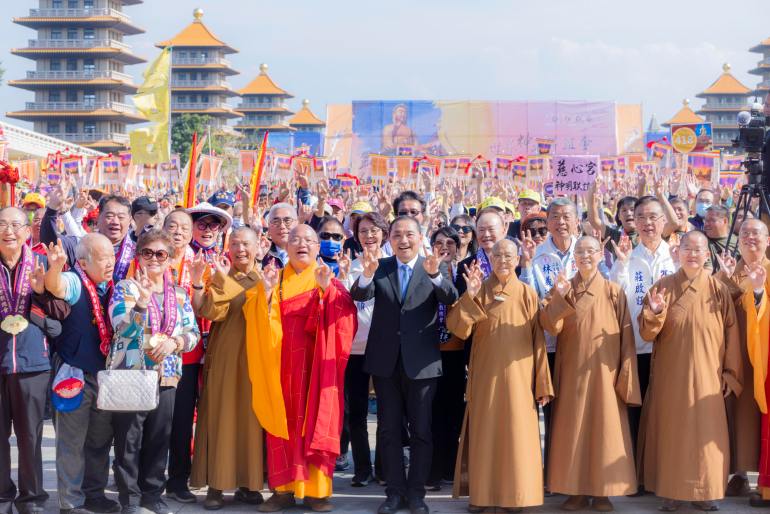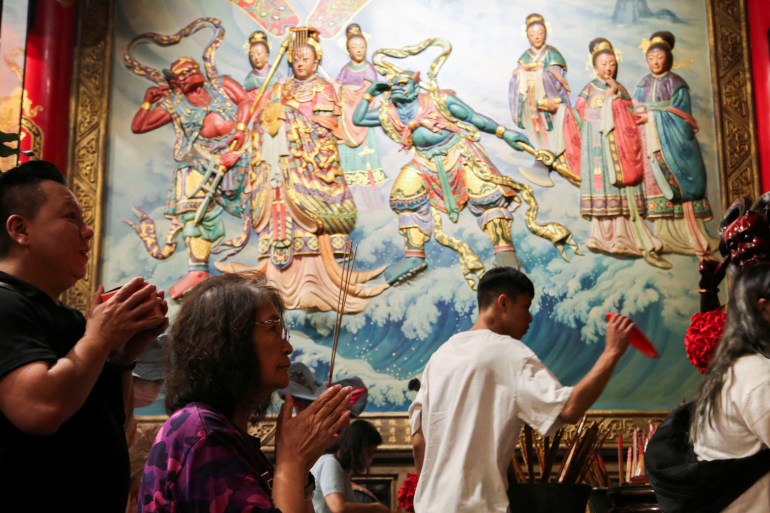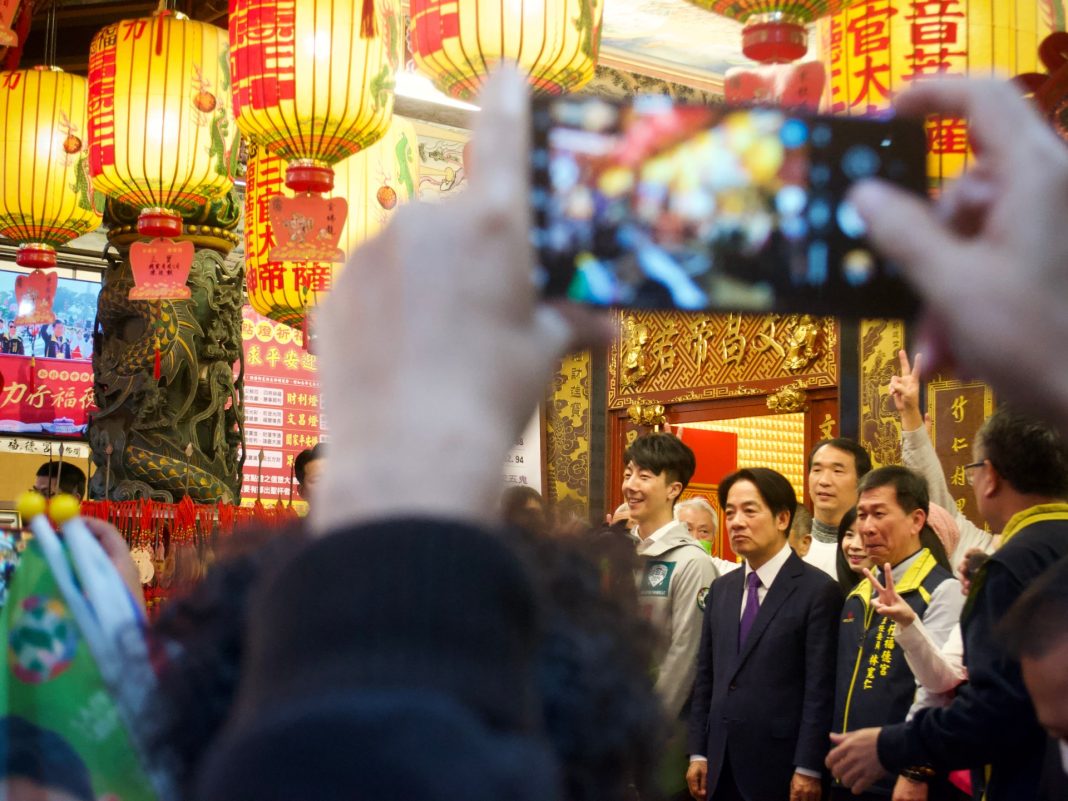New Taipei City, Taiwan – At Lixing Fude temple, one of the largest in the densely-packed district of Zhonghe in New Taipei City, Democratic Progressive Party (DPP) presidential candidate William Lai Ching-te and DPP legislative candidate Wu Zheng lit incense and prayed for health, safety and peace for Taiwan.
Left at the altar were offerings for the community’s local god: fresh fruit baskets, green flags and water bottles with Lai’s and Wu’s faces on them.
After an opening ceremony, temple leaders offered the candidates large bunches of garlic sprouts – symbolising the popular phrase “dongsuan” that is often heard at campaign rallies and means “frozen garlic” in Mandarin, but sounds like “be elected” in Taiwanese. Then Lai and Wu, surrounded by local party and temple leaders, addressed the crowd of about 200 people packed into the temple’s atrium.
“For a long time, Taiwan has been an orphan in the world. But now it’s different. Everyone is looking at Taiwan,” Wu said. “We have to vote for Lai so we can continue the last eight years of [current president] Tsai’s politics that make us well-known in the world.”
The fusion of political and religious life, marked by dozens of temple visits, meetings with religious leaders, and attendance at religious events and festivals, is a cultural staple during the Taiwan elections.

According to the American Institute in Taiwan, nearly 28 percent of Taiwanese follow folk religions (such as local deity worship), 20 percent practise Buddhism, and 19 percent Taoism, while 25 percent identify as non-believers. Many of Taiwan’s local places of worship fuse Buddhist, Taoist and even Christian practices.
More than just religious organisations, temples have long been the cornerstones of their local community, especially in rural areas. The Ministry of Interior estimates that there are 33,000 places of worship in Taiwan, averaging about one every square kilometre.
Taiwan’s faithful is such an important class of voters that Foxconn founder Terry Gou invoked deities numerous times while floating the idea of running for president in 2019 and 2023, claiming earlier this year that the Buddhist-Taoist seafaring goddess Mazu came to him in a dream and told him to join the election to promote peace across the Taiwan Strait. (Gou qualified to appear on the ballot this year but withdrew from the race in November.)
Candidates also make stops at Taiwan’s major religious establishments with huge followings such as Buddha Light Mountain, whose late leader, the “political monk” Hsing Yun, endorsed President Ma Ying-jeou of the China-friendly KMT and met Chinese President Xi Jinping several times.
As Taiwan’s presidential and legislative elections draw closer, some of Taiwan’s major candidates have been making campaign stops at temples nearly every day. On January 13, the self-ruled island of nearly 24 million people will choose a new president and legislature in an election that will determine the future of its relations with China, which views Taiwan as its own and has not ruled out the use of force to achieve its goal.
Hsu Ci-ting and Tseng Tong-ping are local volunteers at Lixing Fude. They say temples are not only convenient locations for candidates to meet voters but also a way for candidates to show their respect for local deities by praying for good fortune during the elections.
“The candidates who come here can close the distance between themselves and the local people here,” said Tseng.
Lin Kuan-jen, the temple’s director, says temples have long been “a public place for Taiwan’s democratic development and freedom of speech”.
Lin says he has known Lai since he was mayor of the southern city of Tainan from 2010 to 2017. He also supported young people during 2014’s Sunflower Movement, a student protest against a proposed free trade agreement with China, where he met Wu.
Hou Yu-ih, the candidate for the KMT and current mayor of New Taipei City, has also been invited to the temple before campaigning ends.

Local temple leaders are commonly involved in local politics and are well-connected in the community, receiving funding from influential elites, says Richard Madsen, a professor emeritus at the University of California San Diego and author of a book about religious development since Taiwan embraced democracy.
“Temples give out things like charitable donations and so forth … so [if] you’re a politician, you want to tap into those kinds of networks,” he said, adding a note of caution. “[In] some places, these temples have been funded by local gangs, [and used for] for money laundering.”
Many of Taiwan’s major religions and religious organisations also have historical and organisational ties to China, making them fertile ground for the Chinese Communist Party’s influence and election interference.
But a lack of government supervision of donations to temples and their exemption from property and income taxes makes that influence difficult to track, according to Lin Hsien-ming, an assistant professor at the Center of Teacher Education at National Pingtung University.
According to the Reuters news agency, Taiwan’s government is on high alert for evidence of Chinese efforts to sway Taiwanese voters by funding China-friendly campaigns conducted via apps or group tours.
Sources identified temples as one area of risk, particularly those that worship Mazu, who has a strong following on both sides of the Taiwan Strait.
China frequently uses “one family” rhetoric in its discourse around Mazu, using the goddess’s origins in China to show that “both sides of the strait are one family,” and like Mazu, people in Taiwan come from China, said Lin.
Taiwan’s legislature has attempted numerous times to draft new laws to modernise its religious regulation while maintaining democratic principles, often sparking an outcry.

In 2022, the legislature passed a law allowing religious institutions to change property registration from individuals to the organisation, which is intended to help prevent individuals from appropriating temple assets.
“No politician will say they forbid people to do religious exchange because the supporters will say, ‘Religion is religion and politics is politics’. The real situation is they cannot be separated,” Lin said. “If you really want to prohibit it, I think it will be very difficult for both green [DPP] and blue [KMT] politicians.”
Back at Lixing Fude temple, leaders laughed when asked how they felt about the potential for Chinese interference via local temples like theirs.
Wu Hui-shen, the temple’s adviser, explained that its main god, Wu Xian, had been brought from China to Taiwan 300 years ago.
In an effort to connect with the roots of their religion, the temple has attended cultural exchange forums with other Wu Xian organisations in China but said their temple did not support any political issue or any one particular party.
“We have freedom of speech and religion in Taiwan,” she said. “Temples shouldn’t be pro-any party.”







